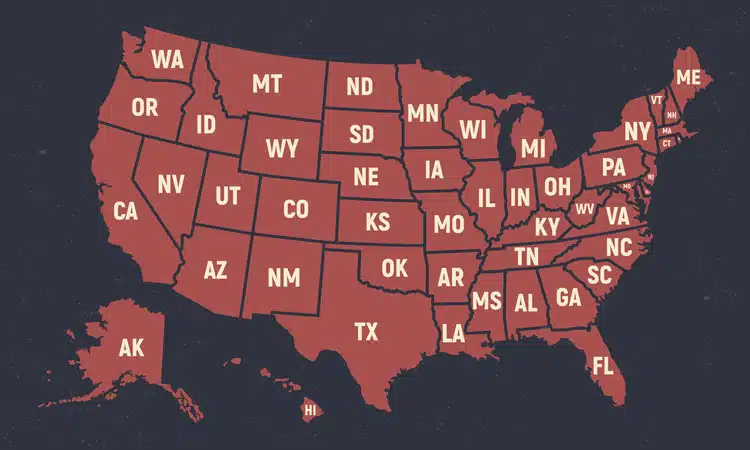Where Is a Texas License to Carry (LTC) Valid?
For Texas gun owners, a License to Carry (LTC) is more than just a piece of paper—it’s a gateway to exercising your right to carry a firearm responsibly and legally. But what happens when life takes you outside the Lone Star State? Whether you’re planning a road trip or moving to a new state, understanding where your Texas LTC is valid can make all the difference in ensuring legal compliance.
This blog will walk you through everything you need to know, including:
- How reciprocity agreements work between Texas and other states,
- A detailed list of states where your Texas LTC is recognized,
- The legal nuances and limitations in each state, and
- Practical tips for traveling or moving with your LTC.
By the end of this guide, you’ll have the tools to carry confidently and responsibly, no matter where you go!
Understanding the Texas License to Carry (LTC)
A Texas License to Carry allows qualified individuals to carry a handgun—either openly or concealed— throughout Texas with legal protections and benefits not provided for under permitless carry. While Texas has permitless carry (often referred to as constitutional carry) for eligible individuals, an LTC offers additional benefits, like bypassing background checks in certain gun purchases, carrying in states that honor reciprocity agreements with Texas and simply being able to carry in more locations with added legal protections.
But here’s the catch: just because you’re legally carrying in Texas doesn’t mean the same rules apply when you cross state borders. That’s where reciprocity agreements come in.
What Are Reciprocity Agreements?
Reciprocity agreements are legal understandings between states that recognize each other’s gun licenses or permits. These agreements ensure that Texas LTC holders can legally carry firearms when traveling to participating states, provided they follow that state’s specific laws.
For example, if Texas has a reciprocity agreement with Oklahoma, a Texas LTC holder can carry a handgun in Oklahoma according to Oklahoma’s firearm laws. However, it’s essential to note that LTC holders must always comply with the local firearm laws of the state they’re visiting, even if they differ significantly from Texas laws.
Without a reciprocity agreement, carrying a firearm—even with a valid Texas LTC—could result in serious legal consequences, including fines or imprisonment.
States That Recognize the Texas LTC
Thanks to reciprocity agreements and recognition laws, Texas LTC holders can legally carry in 37 states! Below is a detailed list of states where your Texas LTC is valid, along with any special considerations to keep in mind:
States Where Texas LTC Is Valid
These states either recognize the LTC or have permitless carry:
- Alabama **
- Alaska *
- Arizona *
- Arkansas
- Colorado **
- Delaware
- Florida *
- Georgia *
- Idaho *
- Indiana *
- Iowa **
- Kansas *
- Kentucky *
- Louisiana *
- Maine (carry under permitless carry)
- Michigan *
- Mississippi *
- Missouri *
- Montana
- Nebraska **
- New Mexico *
- Nevada **
- New Hampshire (carry under permitless carry)
- New Mexico *
- North Carolina
- North Dakota
- Pennsylvania **
- Ohio *
- Oklahoma *
- South Carolina
- South Dakota
- Tennessee
- Utah *
- Virginia *
- West Virginia *
- Wisconsin **
- Wyoming *
*Must be 21 or older
**Must be 21 or older and a Texas resident
Note: Firearms must be carried in accordance with the laws of the state you are visiting. Be sure to check the laws of each state you are visiting.
States/Territories That Do Not Recognize Texas LTC
Unfortunately, several states do not honor the Texas LTC, meaning carrying a firearm could subject you to their penalties:
- California
- Connecticut
- Hawaii
- Illinois
- Maryland
- Massachusetts
- Minnesota
- New Jersey
- New York
- Oregon
- Rhode Island
- Vermont
- Washington
- Washington DC
- Puerto Rico
Always double-check the most recent reciprocity map (available on official government or firearm organization websites) as state laws can change! Texas DPS reciprocity agreements can be found here.
Comparing LTC Regulations in Texas vs. Other States
Understanding how Texas firearm laws differ from those in other states is vital for avoiding unintentional violations. Here are a few important differences to keep in mind:
- Open Carry Laws
While Texas LTC holders can openly carry handguns, many other states allow only concealed carry or prohibit open carry entirely. For example, Florida does not permit open carry, even with a valid license.
- Magazine Capacity Restrictions
States such as Colorado, have a magazine capacity restriction of 15 rounds. This means that is it illegal to be in possession of a pistol or rifle magazine that is capable of holding more than 15 rounds. Texas LTC holders traveling to Colorado are required to abide by these restrictions in order to carry legally. Always check for any magazine capacity restrictions for the state you are traveling to.
- Prohibited Places
In Texas, prohibited places are clearly defined and stated. Prohibited places are specific locations where Texas LTC holders (any permitless carriers) cannot carry a firearm. For Texas, this includes places such as schools, correctional facilities, hospitals, nursing homes, professional sporting events, racetracks, bars and others. When traveling, be sure to check for that states prohibited places.
Practical Tips for LTC Holders Traveling or Relocating
Traveling or relocating with a firearm comes with a set of responsibilities. Here’s how to stay prepared:
1. Stay Updated on Gun Laws
State reciprocity agreements and regulations are subject to change. Consult up-to-date resources like the Texas Department of Public Safety (DPS) website or nonpartisan firearm advocacy groups for reliable information. Organizations such as US Law Shield can also provide up to date information on gun laws in the states you are traveling to.
2. Research State-Specific Restrictions
Before entering another state, review its firearm laws. Look at aspects like storage requirements, transportation rules, and prohibited areas.
3. Carry Important Documentation
Always carry your Texas LTC, as well as a government-issued ID.
4. Practice Safe Transportation
When traveling interstate, ensure your firearm is stored securely. This could be stored securely in a holster on your body (when legal) or stored securely in a locked case when necessary. For air travel, follow TSA guidelines, which include declaring your firearm at the check-in counter and using a hard-sided, lockable case with a lock.
Staying Legal and Responsible as a Texas LTC Holder
Carrying a firearm is both a right and a responsibility. Whether you’re traveling to a neighboring state or relocating across the country, understanding where your Texas LTC is valid—and the local laws that apply—is non-negotiable.
By educating yourself, practicing due diligence, and staying informed, you can make the most of your license while upholding the highest standards of responsible gun ownership. Always remember that laws can change, so it’s wise to regularly check for updates.
For more information on the Texas LTC reciprocity or to explore additional resources, take the official Texas Online LTC class. Stay safe, stay informed, and carry responsibly.



